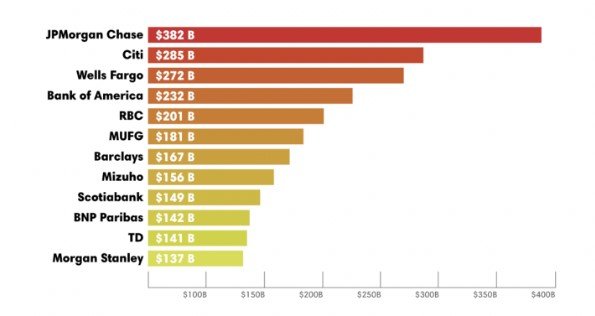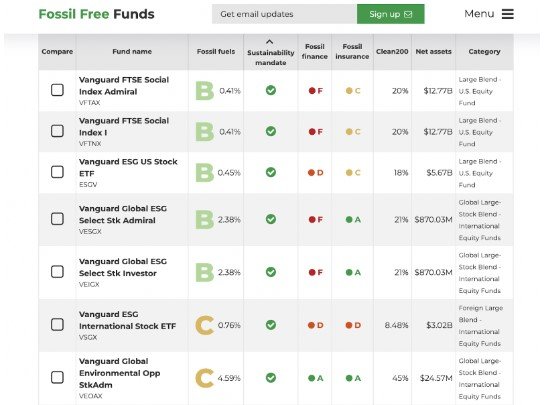Sustainable Banking: How Green Are Your Investments?
By: Frankie Pinchard
Have you ever considered how sustainable your investment portfolio, your 401(k) plans, or even just your pensions are? According to the Morgan Stanley Institute for Sustainable Investing, 85% of U.S. individual investors are considering exactly that.
Since the 2015 Paris Agreement, the world’s six largest banks have contributed $4.6 TRILLION to fossil fuels according to the Banking on Climate Chaos Report, which has recently traced where investments go.
For example, JP Morgan Chase financed $1.214 million to Saudi Arabian Oil co in 2021 alone. Compare this to Barclays whopping $5.6bn investment in the new fossil fuel projects since January 2021.
In the spotlight recently, a UK report found that Barclays had financed a $149 million bond to the company Enbridge. Does this ring a bell? It should. Enbridge partially owns the Dakota access pipeline (DAPL) which is set to pierce the heart of the Oceti Sakowin territory. At present, DAPL is on track to zigzag through Native Oceti Sakowin communities and transport 500,000 barrels of crude oil daily.
(Courtesy of Banking on Climate Chaos Accessed 10 Feb 2023)
Banking on Climate Chaos further emphasises that: “Bank funding for fossil fuels often brings dire threats to the lives and livelihoods of local communities around the world — harming Indigenous Peoples, Black and Brown communities, and poor and working-class communities first and worst.”
In Australia, the Wangan and Jagalingou (W&J) Cultural Custodians’ homelands are threatened by the Carmichael coal project in Queensland funded by the Adani Group. In 2019 an appeal by five W&J representatives was dismissed by the Federal Court. The 2021 coal mine also has serious environmental impacts on the Great Barrier Reef endangered species.
So, what now? Well, there is hope, I promise!
Divestment is a powerful tool that everyone can utilize to combat climate change. The act of pulling one’s assets from unacceptable investments has gained momentum thanks to student activists who jump started the movement on college campuses the past few years. Some notable divestment commitments have come from the University of Oxford, Ford Foundation, Harvard University, the state of Maine to name just a few)
The good news is that large investors like pension plans and insurance companies are responding to this public pressure and you as an individual you can also divest from your own personal investments.
To get you started, check out some of these tools to discover how green your investments are and give you agency over your money!
Using these easy websites, you can look into your investments’ impact on the environment. Start with Fossil Free Funds which simply ranks each investment A-F based on their sustainable investing mandate and whether they are a member of The Forum for Sustainable and Responsible Investment (US-SIF). From there, you are free to filter by deforestation grade and fossil finance grade. You could even put filters on to really line up with your values. Examples include: firearms, prisons, and gender equality.
Let’s take the example of Vanguard which is 9.44% invested in fossil fuel stocks, with $450.46 billion invested across 101 equity funds.
(Courtesy of Fossil Free Funds Accessed 10 Feb 2023)
To sum up, divestment is a powerful tool to combat the climate crisis and I promise it’s easier than it sounds.
Another action you can take is to open up a bank account with a climate positive bank like Atmos. One of our personal favorites is Atmos but feel free to do your own research!
If this topic is of interest to you and you want to learn more, check out our upcoming Climate Change Crews program! On week 2, we will discuss this exact topic and you’ll have the chance to hear from Andrew Behar, CEO of As You Sow, the nonprofit advocacy organization that created some of the resources we’ve listed above.
At Eco.Logic we are committed to inspiring people to take tangible action to address climate change. If you would like to get involved, we will be hosting our next Climate Change Crews starting in April. The program is designed to give people space to talk about climate change and help them take climate action through the support of a community. There are 3 crews: A Chicago-based crew, a DC-based crew, and a virtual crew.


